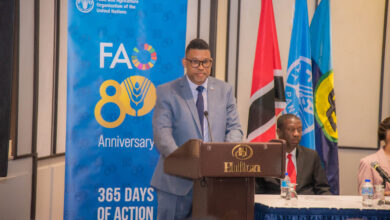United Nations Secretary-General Ban Ki Moon is urging all partners and stakeholders to collaborate to ensure investments are made in the field of statistics towards the achievement of sustainable development.

The UN Secretary-General made the call in a statement to mark World Statistics Day which is being observed today . World Statistics Day follows Caribbean Statistics Day on 15 October.
On this World Statistics Day, I urge all partners and stakeholders to work together to ensure that the necessary investments are made, adequate technical capacity is built, new data sources are explored and innovative processes are applied to give all countries the comprehensive information systems they need to achieve sustainable development,” he said.
The Secretary-General said that there was need to ensure that everyone was counted, especially the most poor and vulnerable.
No child’s birth shall remain unregistered. No incidence of disease, no matter how remote the location, shall remain unrecorded. We need local statistics to ensure that every child has access to education and we need global statistics to monitor the overall effects of climate change,” he said in the message.
This is the second year that World Statistics Day is being observed. According to the UN, this year’s theme emphasises the critical role of high-quality official statistical information in analysis and informed policy decision-making in support of sustainable development. It also reflects the importance of sustainable national statistical capacity to produce reliable and timely statistics and indicators measuring a country’s progress.
The UN General Assembly decided with resolution 69/282 to celebrate the day every five years from now on.
The Assembly also noted that 2015 marks the bicentenary of the birth of George Boole, whose work on the application of the principles of logic as a form of algebra underpins modern computer science.
The first World Statistics Day was celebrated in 2010, as decided in resolution 64/267, and was deemed an overwhelming success, with activities organized in more than 130 Member States and by at least 40 international and regional organizations and entities.
See full statement:
Good data and statistics are indispensable for informed decision-making by all actors in society. This was explicitly acknowledged in 2014, when the United Nations General Assembly adopted the Fundamental Principles of Official Statistics to promote citizen’s entitlement to public information.
As countries and organizations embark on implementing the ambitious 2030 Agenda for Sustainable Development, reliable and timely statistics and indicators are more important than ever. For that reason, World Statistics Day this year is being observed under the theme “Better data, better lives.”
We need to ensure that everyone is counted, especially the most poor and vulnerable. No child’s birth shall remain unregistered. No incidence of disease, no matter how remote the location, shall remain unrecorded. We need local statistics to ensure that every child has access to education and we need global statistics to monitor the overall effects of climate change.
Over the past 15 years, many countries have made considerable efforts to strengthen their national statistical capacity under the leadership of their national statistical offices. The 2010 Population and Housing Census Round, numerous national survey programmes, as well as administrative data, have contributed around the world to improving the information base for monitoring progress towards the Millennium Development Goals, and have contributed significantly to their success.
At the United Nations, the Statistical Commission has for almost 70 years led the global statistical system. Through its standards and guidelines, the Commission has created a language which enables us to communicate data and to share practical experiences globally. Today, the Commission stands ready to play a key role in developing and implementing a solid global measurement process for the Sustainable Development Goals.
However, the monitoring requirements for the success of the Sustainable Development Goals pose a significant challenge to even the most developed countries. We need a data revolution. We need to strengthen statistical capacity and tap into the potential of new technology. We need the contributions and expertise of data producers and users, academia, the private sector and civil society.
On this World Statistics Day, I urge all partners and stakeholders to work together to ensure that the necessary investments are made, adequate technical capacity is built, new data sources are explored and innovative processes are applied to give all countries the comprehensive information systems they need to achieve sustainable development.






